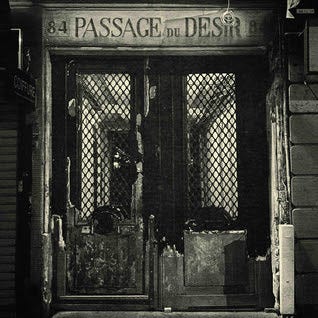Bonus Mixtape: Here Comes Johnny Blue Skies
Sturgill Simpson introduces his nom de plume with the majestic 'Passage Du Desir'
Several years ago on his show, David Letterman introduced this guy I’d heard of but never heard. The song was “Life of Sin” and the artist was Sturgill Simpson.
In the radio and music critic world, we get inundated with press releases - sometimes hourly - most hyping the “real deal.” While a few are valid attempts, some are just shameless pandering to an audience hungry for “authenticity”. Yet now and then, that real deal does sneak through. Don’t misunderstand. This isn’t about discovering an artist that sounds like someone you admired in your youth or recapturing a bygone style. It’s about the spirit and soul of the artist. It’s about believing what you’re singing and/or writing. Doesn’t matter what style you’re playing, if your passion guides you, you’re doing it right.
That’s Sturgill. That’s why it doesn’t matter if he’s playing an old Willie song (by way of Steve Fromholz), covering Rihanna or When In Rome, or channeling Eliminator-era ZZ Top, Nirvana, or the Stanley Brothers, it’ll all come out dripping with Kentucky country soul. It also adds to the fun that, even if it’s sometimes to his detriment, he doesn’t play the celebrity game.
“When people say, ‘Are you him?’ I’ll say, ‘Not anymore’.” - “Scooter Blues”
Released under his “Johnny Blue Skies” alias (he retired his given name professionally following 2021’s The Ballad of Dood & Juanita), Passage Du Desir acts as the perfect Sturgill Simpson primer. There’s the ‘80s synth-lite drive that powered SOUND & FURY, the mystic psych-traditional approach of Metamodern Sounds in Country Music, and the northern-soul approach and lyrical through-line of A Sailor’s Guide to Earth. As a result, Passage Du Desir finds Simpson - OK, Johnny - showing all his sonic cards while preserving that detached, mysterious quality that once seduced a generation of Led Zeppelin, Pink Floyd, and Orion fans. That Simpson maintains an air of mystery in this day of oversharing is admirable. That he also sends out top-notch material at his own pace only adds to his appeal.
Simpson talked to GQ’s Colin Groundwater about Passage Du Desir, noting,
“I just wanted to make love songs,” Simpson said, citing the Bee Gees, Fleetwood Mac, Procol Harum, and “grown-ass man records” by Van Morrison and JJ Cale as influences (“That guy is a prolific listener,” [co-producer David] Ferguson noted).
The resulting album is the perhaps most accessible work Simpson has ever recorded, a musically broad collection of songs about love and loss that span country, pop, and rock. “If you ask me what I just did, I feel like I just made a rock and roll record,” Simpson said. “Honestly, I feel like it’s the most ‘me’ record I’ve ever done, because it’s sort of a little bit of everything else, finally realized together.”
Most of the time, this kind of yakety-yak from an artist is just BS to get through the press cycle and move units, but in Simpson’s case, it fits. There’s the tragedy of losing a friend to suicide that’s recounted in “Jupiter’s Faerie”, the nautical themes that anchor the opener, “Swamp of Sadness”, and, most explicitly, the confessional “Who I Am”, which acts as a bookend of sorts to “You Can Have the Crown” or, maybe, “Life Ain’t Fair and the World is Mean”.
“If the Sun Never Rises Again” evokes the Atlanta Rhythm Section or late-’70s Dr. Hook in full seduction mode, while “Scooter Blues”, detailing his adventures traveling through Thailand literally on a scooter, sways along on a lazy Tony Joe White-meets-Jimmy Buffett vision of paradise. The swamp meets the sea.
Many of the reviews needlessly point out the different types of music covered on Passage Du Desir. It’s simply Sturgill music. It’s the type I’ve always gravitated towards throughout my life, regardless of genre. You can choose your own adventure by listening to Passage Du Desir depending on your perspective, and that’s what’s so fun about being a Simpson fan. The outlaw country of the ‘70s in “Mint Tea” tugged right at the dopamine. I’m a sucker for the old F-C-G chord progression anyway…every single time. Then there’s the War on Drugs approach of “Right Kind of Dream” while the album-closing “One For the Road” heads home with an extended guitar therapy session - sounding in parts like a down-home Alan Parsons Project.
If Sturgill Simpson feels more at home separating his personal life from his professional by going full Johnny Blue Skies on record and in person, let him have it. As long as he continues giving us just a taste of his abilities now and then, that’s more than we deserve.




